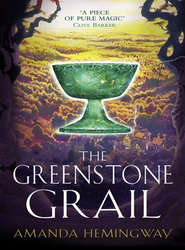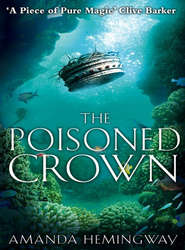По всем вопросам обращайтесь на: info@litportal.ru
(©) 2003-2024.
✖
Prospero’s Children
Автор
Год написания книги
2018
Настройки чтения
Размер шрифта
Высота строк
Поля
‘Do you like it?’ inquired a voice behind her. ‘You seem to be rather absorbed.’
She turned abruptly. The gallery was carpeted and the owner—she was sure he must be the owner—had approached so quietly she had not heard him. ‘I don’t know,’ she said. ‘I haven’t decided. It’s very interesting.’
‘So you don’t believe in impulsive judgements.’ The voice was as smooth as pouring cream with a faint intonation of mockery, but whether lofty or merely teasing it was impossible to tell. There was little humour visible in his expression. Glossy pale grey hair framed his face like a steel halo; his café-crème complexion was unlined, creating an effect of careful preservation rather than enduring youth; his eyes were almond-shaped and flecked with glints of yellow light. He was delicately suave, discreetly elegant, gracefully tall. She disliked him immediately, on impulse. ‘It’s an etching,’ he went on. ‘Did you know?’
‘No, I didn’t.’ Of course she didn’t. ‘I thought etchings had to be in black and white.’
‘The technique is very complex.’ Once again, that trace of superiority. ‘Bellkush has always favoured the most difficult approach. The effect, I think, is almost unearthly—those diaphanous layers of subtle colour. Almost unearthly. Appropriate, perhaps, to the subject matter.’
‘What is it called?’ she asked, rather as if the question had been wrung out of her.
‘Lost City.’ There was a pause while she felt herself drawn back to the contemplation of that crowded portal. ‘Are you here to buy?’
‘I’m waiting for my father.’ She dragged her eyes away from the picture. He must know who she was: he had seen them arrive.
‘Ah…yes. Robin Capel’s daughter. And your name is?’
‘Fernanda.’
‘How pretty. Also unusual.’ Her name might have been a piece of bric-a-brac which had attracted his wandering attention.
‘I had a Spanish grandfather,’ she explained, lapsing into her routine excuse. It was untrue, but she had always felt such an exotic appellation needed more justification than her mother’s erratic taste. She did not approve of foreign names without foreign blood to back them up.
‘Fern!’ Her father, his discussions concluded, came towards them, wearing his habitual expression of slightly anxious goodwill. The young woman who worked at the gallery followed in his wake. ‘So you’ve met Javier. Er—terrific. Terrific. What were you chatting about?’
‘The pictures.’ The man answered for her.
‘I’m afraid you must have found my daughter’s taste a bit—well, conservative. She’s a very down-to-earth young lady, you know. Likes sitters in portraits to have all their features in the right place, trees to be the proper shade of green—that sort of thing. Only abstract painter I’ve ever known her to admire is Mondrian. She says he’d make nice kitchen wallpaper.’
‘That would be a very expensive kitchen,’ said the man called Javier. Robin and the woman both laughed.
‘Daddy, don’t make me sound so boring,’ Fern said, wanting to leave.
‘Just a joke, darling. Oh—I’d like you to meet Alison Redmond. We’re definitely going to collaborate on the witchcraft book. She’ll organise several of the artists here to do the illustrations. It should be a big success. Alison, my daughter Fernanda.’
They exchanged a polite handshake. Close up, the woman was not so young: her face was long and pointed with an incongruously full mouth adorning its thin structure and pale narrow eyes between heavily mascaraed lashes. Her off-blonde hair was waist-length and worn loose. Had Fern not been too prosaic for such comparisons she would have thought her father’s future collaborator resembled a witch herself.
‘Terrific,’ murmured Ms Redmond. Possibly Fern imagined the same elusive mockery in her voice that she had detected in Javier’s smooth accents. For a moment, seeing her father standing between them, she was visited with the illusion that he was somehow trapped, hemmed in by two predatory figures, the man with his superior height and superior smile, the woman with her warmth of manner and coldness of eye. The impression of danger, though fleeting, disturbed her because it seemed out of all proportion to the actual threat. In the six years since her mother died Fern had monitored her father’s love-life with the skill of an international statesman, dismissing a succession of unsuitable candidates out-of-hand. The menace here was surely similar, the standard hazard of marauding huntress and hapless prey; she had dealt with it a hundred times, and she had never before experienced any doubts or premonitions. But then, Fern did not believe in premonitions.
Robin shook more hands in farewell, while she resisted an irrational urge to drag him away.
That was the beginning, she decided long afterwards. The meeting at the gallery, the sense of menace, the picture. The incident seemed trivial enough at the time but it left her feeling vaguely perturbed, as if the outlying penumbra of some far-flung shadow had brushed the borderline of her bright safe world, or she had caught a few isolated notes of an eerie music which would soon come booming from every corner of the universe, obliterating all other sound. The events of that extraordinary and terrifying summer became perhaps easier to assimilate because she was in some sort prepared: from the moment of that initial encounter an unfamiliar atmosphere began to seep into her life, unsettling her, unbalancing her cultivated equilibrium, making her vulnerable, unsure, receptive to change. She was sixteen years old, well-behaved, intelligent, motivated, a product of the Eighties in which she lived, viewing the world with a practical realism engendered by the early death of her mother and the responsibilities which had devolved on her as a result of it. Her father’s easy-going manner had acquired its undercurrent of anxiety from that time, left alone with a small daughter and smaller son, but it was Fern who had gradually taken charge of the household, trading au pair for housekeeper, seeing the bills were paid, bossing her surviving parent, attempting to boss her younger brother. She had coasted through puberty and adolescence without rebellion or trauma, avoiding hard drugs, excessive alcohol, and underage sex. Her future was carefully planned, with no room for surprises. University; a suitable career; at some point, a prudent marriage. She thought of herself as grown up but behind the sedate façade she was still a child, shutting out the unknown with illusions of security and control. That summer the illusions would be dissipated and the unknown would invade her existence, transforming the self-possessed girl into someone desperate, frightened, uncertain, alone—the raw material of an adult.
The day after their visit to the Holt Gallery they collected her brother from school and drove out of London to see the house. That was the next thing. The house. On the death of a distant relative Robin had inherited a property in a remote part of Yorkshire, and before putting it on the market his accountant had suggested he might like to take a look at it. ‘Good idea,’ Robin had responded. ‘Could do with a break. Nice for the kids. They’re a real pair of townies: need a taste of the country. Never know, might decide to keep it, do it up a bit, that sort of thing. Use it for weekends and holidays. Good idea.’ Perceiving too late the pitfalls ahead, his accountant’s heart sank visibly. Robin Capel had a flair for turning potential assets into costly liabilities. Fortunately, Fernanda could be counted on to veto the additional expense. Robin ran a small but lucrative publishing company producing coffee-table books of the type bought by the illiterate as a substitute for reading, but although he was an excellent editor with a genuine enthusiasm for the banal, financial management was beyond him.
‘We never take a holiday in England, Daddy,’ Fern pointed out en route north. We generally rent a villa in Tuscany in the summer and go skiing in France or Switzerland in winter. You can’t ski in Yorkshire and they don’t make very good Chianti. It just isn’t sensible to keep a place we’ll hardly ever use.’
‘You’re obsessed with being sensible,’ said William from the back seat. ‘Women go through life with a shopping list, and when someone gives them anything that isn’t on it—even if it’s something really precious—they simply throw it out of the basket.’
‘Who said that?’ Fern asked sharply.
‘Mr Calder. History.’
His sister shook her head. ‘You’re slipping, Will,’ she said. ‘Last time you made a nasty remark about women you attributed it to the English master. You can’t expect me to believe all your teachers are male chauvinists.’
‘Why not?’ he retorted, unabashed. At twelve, he was as tall as his sister and slight and supple as a whip. His face had that quality of luminous clarity, common to elves and angels, which the unwary so often mistake for innocence. He changed the subject without apology or embarrassment.
‘If Great-Uncle Edward barely knew you,’ he asked Robin, ‘why did he leave you his house?’
‘No one else to leave it to,’ Robin surmised. ‘He wasn’t really my great-uncle. Or yours. My grandfather’s cousin. Might make him my great-cousin, I suppose. Maybe a couple of greats.’
‘One will do,’ said Fern.
‘He must have been awfully old,’ Will mused.
‘Youngest of his family,’ Robin explained. ‘Lots of sisters. Story goes, he ran away to sea when he was a boy—merchant navy—and didn’t come back till they’d all died. Part of the Capel legend. Don’t know if that’s what really happened. None of the sisters married—unless some of them were widowed—anyway, there were no children. Ned Capel didn’t marry either. Overdosed on women at an early age, I expect. The sisters all lived in that house until they sort of faded away and then he came home and vegetated there too. Must have been about ninety when he died. The sisters were fairly ancient as well. Remember visiting once with my grandparents: I think I was about Will’s age. There were three or four of them left by then: Esme and Deirdre and Irene—don’t recall any other names. Esme—no, Eithne—they called her the baby. Seventy-five at least. Very small with a wrinkled little face all eyes, like a marmoset in flowered chiffon. “I made the seed cake myself,” she told me. Frightful stuff. Tasted of sand.’
‘What’s seed cake?’ asked Will, intrigued.
‘Told you,’ said Robin. ‘Sand.’
They arrived in Yorkshire around ten that evening. Fern, normally a faultless map-reader, was in an edgy mood after losing them twice. Although it was May the weather was cold and a thin drizzle misted the windscreen whenever Robin tried switching off the wipers. The lights of a straggling village glittered through the rain as they crossed the Yarrow and climbed uphill; few lights and far between, lurking behind deep-set windows and close-drawn curtains, not unwelcoming but distant, keeping themselves to themselves. Following directions conveyed by Ned Capel’s solicitors they left the village and continued on into the dark, turning off at last up a steep drive which proved to be more like a cart-track, their rough passage shaking the Audi until its Vorsprung seemed about to come unsprung. The drive widened and levelled out in front of the house and Robin stopped the car. Little of the façade was visible through the rain-swept gloom except for the tall windows, many of them arched, black in the grey wall. The former housekeeper, a local woman, had been informed of their advent but there were no lights showing, no indications that they were expected. The house might have stood unoccupied for years. It looked dour, unfriendly, desolate as the surrounding countryside, hugging itself around the hollow darkness of its dusty rooms. Fern produced a torch and the roving beam picked out the entrance, tag-ends of creeper casting wavering fingers of shadow across the front door. In the blurred lozenge of light this was seen to be of unvarnished oak, splintered and weather-bleached, and as solid as the door to a dungeon. A modern Yale lock had been added, but the key turned reluctantly and the door creaked open under duress, scraping over bare boards. The hall inside was chilly and almost pitch-black. Fern took a long time finding the lightswitch: the skittering beam glanced over the lower treads of a winding stair and flicked in and out of curious niches and past angled doorways, blinking back abruptly from the depths of a stained mirror. Low-wattage illumination did little to improve matters, showing the details of cobwebs trailing from ceiling and lamp-shade and patches of discoloration on walls which might originally have been painted white.
Will gazed about him without enthusiasm. ‘Fern’s right,’ he said. ‘What’s the point of a house we won’t use? I think we should sell.’
‘I must say,’ Robin averred, ‘it looks a bit off-putting. Could move on, I suppose. Find a B & Β. Come back in the morning.’
‘No.’ Fern’s tone did not admit of argument. ‘We’re here and we’re going to stay. You were both so set on coming: well, I don’t intend to run away just because there isn’t a red carpet. Mrs Wicklow was asked to leave us tea and milk and so on. Let’s find the kitchen.’
She deposited the torch on a table and opened the door to her left, flicking an adjacent switch. A yellow glow sprang into being, no mellow radiance but a tired, sickly, off-colour light, as if the bulbs which provided it were continuously on the verge of expiring. It illumined a long drawing room with a few pieces of cumbersome furniture, the velvet upholstery rubbed raw by past occupants, a carpet mottled with age and dirt, and a wide empty fireplace bringing to her the dreary moan of the wind in the chimney. A grandfather clock ticked loudly, but there were no other sounds. At the far end of the room was an alcove, and peering out of it was the Face. For an instant, for all her resolute nerves, Fern stifled a gasp that was almost a cry. It was the face of a malevolent Buddha, not pensive and serene but gloating, somehow sly, the broad lips half parted in an unholy smile, the eyelids creased at some inscrutable jest, stubby horns protruding above a low brow. One of the light-bulbs flickered and she had the illusion that the idol had winked at her. ‘It’s a statue,’ she told herself. ‘Only a statue.’ Inadvertently, she spoke aloud.
Will and Robin had been investigating other doors but her brother heard her and came back to the hall. ‘What’s the matter?’ he said. ‘Did you call?’
‘It was the statue,’ she said, ‘It gave me a shock.’
Will pushed past her to take a closer look. ‘It’s hideous,’ he said gleefully. ‘I’ll bet Great-Cousin Ned brought it back from his travels. Sailors always pick up stuff in foreign parts, don’t they? This place could be full of strange things. Some of them might be valuable.’
‘Pirates’ treasure, I suppose?’ said Fern, reassured by his ebullience. ‘Doubloons, and pieces of eight.’
‘I thought a doubloon was something you wore.’ Will had stopped a couple of feet in front of the idol, and suddenly he turned away. ‘Actually, I don’t think I do like it very much. I wonder what it’s laughing at?’
‘I don’t really want to know,’ said Fern.
Robin found the kitchen, at the back of the house. It was stone-flagged, cold but clean, with the barren air of a kitchen where nothing had been cooked in a long while. A jar of coffee, packets of sugar and tea, and a plate of sandwiches in clingfilm stood on the table, looking like the isolated relics of an alien visitation. There was milk in the fridge. They had snacked at a pub on the way, but Will and Robin tucked into the sandwiches, one eagerly, the other absent-mindedly. Fern searched for a teapot to make tea.
‘It’s a depressing sort of house, isn’t it?’ Robin commented between mouthfuls.
‘That’s Yorkshire for you,’ said his daughter.










